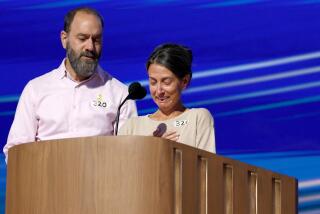For an Israeli Palestinian American, Finally, the Promise of a Normal Identity
- Share via
As Yasser Arafat spoke before the United Nations, I glued myself to my television set in the role of a political scientist, carefully listening to the words being uttered in Arabic, looking for new clues, hopeful developments, promising breakthroughs. I was hardly surprised by what I heard, but as Arafat closed his speech with a dramatic plea to Israeli leaders to forge peace, I suddenly dropped my professional robe, let down my macho Middle Eastern guard, and wept openly. The American decision to open dialogue with the Palestine Liberation Organization brought another rush of emotion.
For me, this issue is personal. Growing up as both an Israeli and a Palestinian, I developed a paradoxical empathy for both people; a Palestinian-Israeli peace would thus resolve much of the enduring dissonance for me. But the thoughts that the words provoked were more universal. At the heart of it all was the dilemma of an egalitarian universalist who, in seeking normalization in a world of nationalism, succumbs to the need for a nationalism of his own. As Arafat spoke of the possible and the realistic, instead of the ideal and the unattainable, I could not help but reflect on the striking similarities in the evolutions of Zionism and Palestinian nationalism.
Traumatized by their suffering in the conflict with Israel, many Palestinians have been unable to empathize with a Jewish dilemma similar to their own. Although their ethnic heritage was always a presence, many of the founders of Zionism in the late 19th Century were Western intellectuals espousing universalist egalitarian ideals, seeking equality in the European context. To their dismay, the emerging world of ethnic and territorial nationalism prevented their normalization; the very historic roots that they sought to overcome came back to haunt them as their fellow Europeans persecuted them. Their conclusion was simple: In a world of nationalism, normalization could be attained only by actuating their Jewish nationalism through a state of their own. And although some Zionists suggested locations other than Palestine for this Jewish state, the historic and religious linkage with the Holy Land ruled other locations out.
Palestinian nationalism also has evolved out of more universal ideals into the realism of statism. Although the Arabs of Palestine had developed a distinctive identity as early as the 19th Century, this identity was subordinated to a more general Arab nationalism, or to a more universal egalitarian idealism. The driving force of the Palestinian movement after the first Arab-Israeli war and the resulting Palestinian homelessness was this: the right of return to the homeland and the establishment of justice in the context of the general Arab and universal ideals--objectives incompatible with a Jewish state in Palestine.
But four decades of immense suffering at the hands of states--Arab states as well as Israel--have taught the Palestinians a lesson, one that European Jews learned nearly a century before: that, ideals aside, normalization in the real world of state nationalism can be attained only by having one’s own state; Palestinian nationalism can be manifested only through the state of Palestine.
Although Palestinians shared their ideals with many around the world, and despite their common cultural and historic bonds with other Arabs, territorial nationalism always dominated, and the Palestinians paid a price: As Arab as Egypt or Syria are in sentiment, state interests always came first. It was thus that Palestinian nationalism moved to the top of the Palestinian agenda, with the objective being a Palestinian state in part of Palestine. Arafat’s speech before the United Nations was a formalization of this transformation in Palestinian priorities.
For the first time, a window is seriously opened for both Palestinians and Israelis: two states in Palestine, one reflecting Jewish nationalism, the other Palestinian nationalism, constituting, by definition, a compromise with ideals, but providing the only promise for some normalization in this world of nationalism.
Nationalism and statehood do not, of course, resolve issues of collective identity completely. An ironic example confronted me even as Arafat spoke in Geneva: A visiting friend, an American Jew, asked me, an American Palestinian, about the symbolism of Hanukkah and about the Hebrew meaning of the word. At the same time, Israel, the state, was debating “who is a Jew,” a debate that may finally be decided by the vote of Arab members of the Knesset. Other examples abound. Are Israeli Arabs first Arab or Israeli? What about American Jews, Kuwaiti Palestinians or Iranian Arabs? Recent history provides interesting answers: Even where there are strong conflicting identities, state-identification dominates the behavior of most people. Iranian Arabs remained loyal to Iran in the recent war with Iraq; Shia Iraqis have not abandoned their state, despite some affinity with the Ayatollah; and Israeli Arabs are behaviorally loyal to the state despite strong Palestinian sentiments.
Dual identities have a positive side: The tendency to harmonize one’s own conflicting identities results in a drive to resolve the conflicts between peoples reflecting these identities. It is this side that moved me so deeply last week. Without a satisfaction of the Palestinian need of self-determination, I could not come to full terms with my Israeli identity; and without normality and security for both Palestinians and Israelis, enduring guilt will prevent me from enjoying a normal life in my new American homeland.
The final irony for this egalitarian seeking his place in a world of nationalism is that pondering the issues of the Israeli-Palestinian conflict has intensified my Americanism; where else in this world today can a man with my background attain more normalcy than I have attained? And with the announced American-Palestinian dialogue providing the United States a constructive role in building an Israeli-Palestinian peace, I have even more reason to feel at home.
More to Read
Sign up for Essential California
The most important California stories and recommendations in your inbox every morning.
You may occasionally receive promotional content from the Los Angeles Times.













